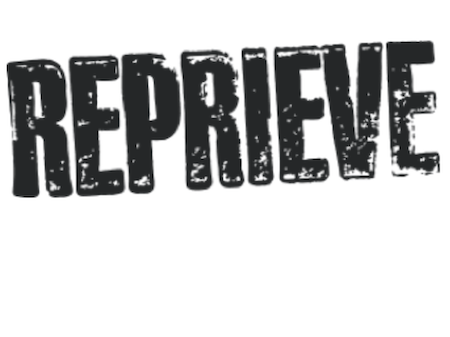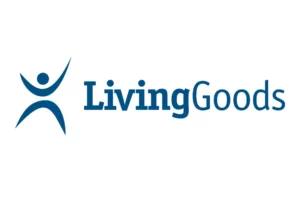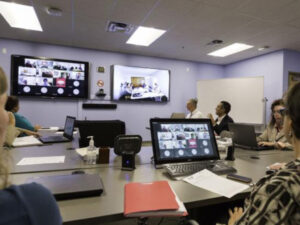Reprieve uncovers and challenges human rights abuses in courts of law around the world and fights for people on death row.
Maya Foa of Reprieve spoke with Lissa Harris on April 13, 2023. Click here to read the full conversation with insights highlighted.
Lissa Harris: If we could start off with you introducing yourself and your organization, and if you could talk a little bit about the problem that you’re trying to solve.
Maya Foa: Absolutely, I’m Maya Foa, I am the Joint Executive Director of an organization called Reprieve. Reprieve focuses on two main areas which are linked by abuse of power. The first is the death penalty. We look at the death penalty worldwide and strategies to stop executions and ultimately end the death penalty. On the other side we look at abuses perpetrated by governments in the name of the so-called war on terror, so the aftermath or the reincarnation of that war on terror philosophy.
Lissa Harris: Can you talk about who the beneficiaries of your work are? Is it direct service to individuals? And if not, who are the beneficiaries and how do they benefit from the work that you do?
Maya Foa: We call them clients rather than beneficiaries, because what we’re doing is actually performing a service for them. Our clients are people on death row around the world. They are people facing execution around the world and they are people who have either been harmed by or are at risk of harm from abusive counter-terrorism practices. That might be a person who is or was held in Guantanamo, somebody who was subjected to extraordinary rendition, somebody who is currently held in arbitrary detention, subjected to torture, all in the name of the so-called war on terror. National security policies that actually undermine people’s rights. In general that whole client base are people who are very often from marginalized communities, disproportionately people of color, and people who have suffered already at the hands of societal and governmental forces, which are against them.
Lissa Harris: How do you do this work with your clients given the barriers? Could you talk about the barriers, to even making that connection and figuring out what their needs are and trying to serve them? How do you do that specifically?
Maya Foa: I’ll give an example of one of our projects that might look quite far away from the issue of the death penalty, and that is the work that we have done on lethal injections in the United States. In the US they execute people using lethal injection. It was ushered in as this clean, modern, cheap, humane, easy method of execution, the medicalized execution. And it of course is none of those things. It is not humane, it is not clean, and it is definitely not medical. I started looking into this in 2010, over a decade ago, to look at where these drugs were coming from. At the time there was a shortage of one of the drugs, these are normal medical drugs, it was sodium thiopental, which is an anesthetic in the United States.
Because of that shortage, these departments of corrections and the execution chambers have had to look elsewhere for some of the drugs, and they have ended up coming to England. At the time, l was living in London and I was tasked with working out where the drugs might have come from. I knew nothing about lethal injection at the time, I knew nothing about global supply chains, pharmaceuticals, all of that, but I got really fascinated by this question that one day. It was the day of an execution, I was digging in to try and figure it out before the execution itself, on a deadline, where did these drugs come from? I didn’t figure out where they came from, but what I did figure out was that they definitely weren’t USFDA approved. They weren’t good drugs. They might have been veterinary, or they could have come from somewhere else.
I sent all that information over to the lawyer working on the case, they put it into an affidavit from me, and we got a stay of execution that night. Then the stay got overturned a few hours later, unbeknownst to me. I was sleeping at the time and I woke up to the news that they had executed the client with these bad drugs. That really shocked me, and it also mobilized me. I continued to dig in and figure out where the drugs came from. I identified that these states had been buying drugs from the backroom of a driving school, which was operating as a pharmacy. And this pharmacy, this individual driving school, was selling them to states across the US. Bad drugs.
In my organization, we used lots of different courts. We took the UK government to court, we said we need export control on this drug, because the drug is not intended for use in executions and it’s being sold and torturing people to death. We got that export control. We then got export control across Europe. And then an interesting thing happened. US states were unable to get this one drug, sodium thiopental, and so some of them moved to a new drug called pentobarbital. That drug was manufactured at the time by one FDA approved company called Lundbeck, operating out of Denmark.
I traveled to Denmark and I started having conversations with the company saying, “You guys don’t want your drug used to kill people,” because that’s the point, these pharmaceutical companies never wanted their drugs to be used to kill prisoners. They just didn’t know what to do about it, and not many companies were affected until now. I talked to Lundbeck, who said, “We’re between a rock and a hard place. We’ve got all these patients we’re serving, and then there are some prisoners, and we don’t want them to be executed using our drugs, but there’s nothing we can do.”
I sat there in a dark corner of my tiny office going, hang on a minute, there must be something they can do, and designed a new system for distribution of the drug using principles that existed in the pharmaceutical supply chain, which is why I say that matters. I presented it to the CEO, and, after a couple of months of us battling in the headlines, all to use the court of public opinion, the CEO said our solution sounded good. And it actually worked. They put the controls in place, states couldn’t get those drugs to kill people, which was in the pharmaceutical company’s interest and ours.
Since then I’ve worked with 50 plus global manufacturers, including Pfizer, Glaxo, Johnson & Johnson, AlbaGEN, all of the companies you know, and they’ve all put in place these distribution controls and put statements out saying, “We oppose the misuse of our medicines in executions.”
If states can’t get the drugs from manufacturers, they have a couple of options. One, stop executing. That’s a good one. That’s my preference, and it has happened, a lot of states aren’t executing because of issues with lethal injection drugs. Two, they change protocol and move to a new drug combo. Well, that’s fine, we now have an industry standard. Every company knows what to do, and I continue to advise them, but they’re very sophisticated. It’s not in their interests to have their medicines, which are designed to save and improve the lives and health of patients, used to torture and kill prisoners. Now that they have the solution, which was one that we had to find, they can implement it and it serves their purposes now.
I’ll give you an example of how far this has gone in terms of corporate engagement. The death penalty is very hard to fight in the courts in every country, and very often the law is stacked against you. I have had clients, or lawyers I’ve been assisting with clients on death row in states where the courts have basically rejected all of their appeals. I’ve then had states where the Department of Corrections has bought drugs that were controlled, so it was a breach of contract. Those corporations, in the same states where the courts have said, we’re not going to grant your client relief on the basis of innocence or potential torture, any of the really strong legal arguments. But when those companies have said, hang on a minute, you’ve got our drugs through breach of contract, we’re suing you, they’ve been granted relief. And what does that mean? That means that the state can’t use those drugs to kill the client.
Now you end up in a situation whereby by bringing in this other sector, which is the corporate sector, you change the power dynamic and you’re then dancing in a different arena. One of the things that Reprieve does a lot is try to find creative strategies to tackle these really tough problems, because in my belief you can’t go full-frontal at a really tricky problem like the death penalty, you have to come at it obliquely, or use guerilla warfare, as we say. So that’s one example.
Lissa Harris: That’s pretty striking. I feel like you don’t always see such a direct line between trying to intervene for one individual and this more systems level shift.
Maya Foa: Now, 13 years on, I serve 50 companies that we’ve polled about use of medicines for executions, the industry association said it, the companies put distribution controls in place. Even the insurance industry has started to look at this, I need more of them, but they’ve started to look at this and put due diligence policies in place for the very rare pharmacies that would seek to violate these systems. Most states can’t get the drugs, or are tied up in lethal injection litigation, or themselves have said, well, hang on a minute, now that we’re forced to pay attention to this issue, we’re actually recognizing that it isn’t a clean, humane, easy, quick method of execution. Actually it’s messy, it’s barbaric, some of these executions take hours, and there’s nothing medical about it, it’s human experimentation.
We are seeing a turn away from lethal injection, and that is critical, not just because the number of executions has dropped dramatically, and I can draw the line between the work on lethal injection and the stays of execution, but also because it’s calling into question the method per se. If states are forced to move to another method, we know from the polling that support for the death penalty drops. It’s also a very interesting question of how we feel about putting people to death. Are we only happy to do it behind a curtain where nobody can see we’re actually torturing people to death, and disproportionately Black and Brown people? But if we had to see a firing squad, or whatever else, which is not more humane, they are all inhumane, we wouldn’t like it? What does that tell us about how we really feel about this?
That is one of the system led approaches that we’ve taken, because we can, and it’s part of our USP, to deliver creative strategies to solve big problems.
Lissa Harris: I have a feeling that we just talked about this question that I’m going to ask, but what do you think makes you different in the space of the problem that you’re trying to solve? What makes your approach distinctive to other orgs that are working on this?
Maya Foa: We always collaborate, and many organizations do. We’re small. I would never go to a place where I think Reprieve can’t add value.I’ll tell you about the value add that I think we have, and it differs from place to place. I just gave you the example of our work in the US on the death penalty. We were founded by a capital defense attorney during very creative, but traditional, individual client lawyering. There are lots of fantastic capital defense lawyers, and I work with them. I want to do something different that helps, and that really creates personal abolitionists.
By stopping the flow of execution drugs, which I am very uniquely well-placed to do at Reprieve because we sit in London. We have access to lots of different markets, we are lawyers, we’re also investigators, we can do the court of public opinion stuff, I can work with the corporations, and no one else is doing it. You can create space, like stop executions to create space for abolitionists who are talking about issues that really touch and move people’s hearts and minds, innocence, racial injustice, poverty and the way that lines up with the death penalty and executions, you give them the space and time to make those arguments to propel abolition. We have these creative solutions that are systemic and allow other actors locally to do the work that only local actors can do, really. So that’s one example in the US.
Similarly, in a place like Malawi, where we have wonderful partners, we bring a different expertise that compliments their expertise, and that expertise from our side is the practice of using our position to leverage lessons from different jurisdictions and different courts. We have access to the court of public opinion in lots of different countries, we are able to bring cases from one place to another place and suggest different methods for solving problems because you see the same problems replicated. That’s a particular benefit that we bring, but also a strategy that we have honed over the years of doing this work.
Lissa Harris: The lethal injection work is a really powerful example, do you have another favorite example of something that illustrates the impact of the work that you do?
Maya Foa: Sure, I’ll stick with Malawi. Malawi has the death penalty. As in many countries around the world, they didn’t used to have the death penalty, it was brought in by the British, and it’s a colonial legacy. We’ve been working for many years with partner organizations on the ground to address a problem that emerged after a really successful court judgment. There was a case in Malawi which ruled the mandatory death penalty unconstitutional. What the mandatory death penalty means is if you are charged with a certain category of crime, you get the death penalty regardless.
Alice, a woman who was from a rural village in Malawi, was a mother of three children who had been beaten by her husband extraordinarily violently over their whole marriage in front of her children. He was a drunk. He came home intoxicated one day, she was sleeping next to her mother, and he was so drunk and so aggressive he pulled the hinges off the door and he went in. He had an ax, and he was going to beat her. She defended herself and she ended up hitting him with the ax. She called the police. She had also reported all the domestic violence over time, and nothing had happened. He died later from the injuries and she was the one who got sentenced to death because it was the mandatory death penalty. That means you don’t get any consideration of the mitigating factors, the court didn’t get to hear she had been beaten over decades, that she was acting in self-defense, that he was drunk, any of these things.
There were about over 200 people on death row in Malawi, and Reprieve partnered with organizations on the ground, and we were able to, with limited funding, work together with those organizations to do new hearings for all of the people who had been sentenced to death under the mandatory death penalty. From those hearings, the majority got out and are back, because a life term is short-ish in Malawi, relatively, so they got out and went back into their villages. In the course of three years or so, death row was nearly empty. It was really quick and amazing, and we got some fantastic judgements that working in the US, we would die for that kind of jurisprudence. It is really interesting to see the progressive jurisprudence coming out of Africa, and coming out of Malawi specifically.
We did a survey of the village headman, it’s a tribal society, to get the temperature of the public on the death penalty. Over 90% said they didn’t support the death penalty because, and I’m quoting from one of the village headmen, “Prison is for reform, there’s no reform in death.” The people who had got back out into their communities were now valuable members of the community, and these are villages from which the tribal leaders had people return who had been in prison, and they were welcomed back. The fifteen people who were left on death row all got clemency in the last year or so by the president. We’ve been working with our fantastic Malawian fellows, and there’s an abolition bill that we expect to be pushed forward over the course of the next year.
In fact, there was a court judgment that did abolish the death penalty, for a wrinkle it went backwards, but the political climate has changed. I was with the Minister of Justice at an event a few months back, he was talking about abolition, and that’s all happened because of these partnerships and the ability to bring together different stakeholders. Reprieve is working in different courts. Court of law is one, when you can access it, but the court of public opinion, the political courtroom, the corporate courtroom, and the artistic courtroom, we activate as many different domains as we can in an agile way. Being very focused and strategic. Abolition in Malawi and a cleared death row is another indicator of impact.
Lissa Harris: What insights or teachable lessons do you think can be drawn from your work that others, either in this field, or maybe working on another problem, could learn from?
Maya Foa: When I talk about my work at Reprieve, people hear death penalty, they hear terrorism, they hear torture, arbitrary detention, extra judicial executions, et cetera, and they think it is so hard or very depressing. The thing that people sometimes don’t see, if they’re not around the sector, is that all of these problems are actually solvable. It takes time, and you might need to do it in increments, but if you are strategic, if you have good people and you’re planting the right seeds, I believe you will see progress over time. The arc of change is seven years, but very often you see it in four years. If you’ve been working in the area for a while and you plant the right seeds, then every few years you’re seeing people coming out of prison, or a policy change, or some other development.
It’s not magical thinking, it’s actually strategy, like any other industry. That’s my big point. I’ve trained as a lawyer, and I think people can be quite cynical about the soft law, so business and human rights is soft law, some of the UN mechanisms. But everything combined, and you can give soft law a punch, you can make it hard by doing different things, by operating strategically in different courts at the same time. I wasn’t the first person to say, well, hang on a minute, these drugs, they were made to save people, and that company, they say they want to save lives and they’re being used to kill people. But I was the person who thought, how would I do this if I were the CEO of that company and I’ve got all of these things that I stand for, and I’ve got my profit margins and my motivation and my PR. If I think that these two things are in conflict, the death penalty and my mission, how would I actually reconcile it? How do I use the technology? I didn’t just shout at companies to do it differently, I found the solution for them, and I sat opposite the CEO of Lundbeck, and his comms guy said, “Oh, no. We can’t do that,” because he was doing his job, he was pushing away the issue of the death penalty, pushing away the activists at the table. The CEO, to his enormous credit, put his hand up and said, “Why? Why can’t we do that? Why wouldn’t we do that?” And then they did it, and it worked, and now everybody else is doing it.
I think not being cynical about some of the tools that we have in our toolkit, on their own maybe they won’t do it, and it is hard, but it is much easier to say why a legal system, or a political system, or a system of corporate accountability doesn’t work then it is to say, “I know it’s flawed, but let me see what I can do here.” So that would be my advice, go slightly beyond our natural understandable intelligent cynicism.
Lissa Harris: How do you measure success, and what evidence do you use to track your progress?
Maya Foa: With the death penalty, in some ways it’s relatively straightforward. I’m going to regret saying that, but you are looking at countries with laws, you can look at law change, change in policy and moratoria, abolition. You can also look at the number of cases you’ve taken on and where those cases have gone. Have people been executed or have they not been executed, if they come off death row? It’s obviously not the full story, and necessarily, you can do all sorts of things, you can be working with fantastic lawyers and somebody can be executed. It doesn’t mean you weren’t successful in the work that you did to try to prevent it, but the outcome didn’t go your way, perhaps because of a political decision, or something else that wasn’t in your control. So there are indicators, they’re not infallible.
Some of the other work, which is really important to me, like the counterterrorism work, the way we think about and treat people we have decided are the worst of the worst, with the death penalty, we talk about these people as the worst of the worst, but so too do we say that about people we call terrorists. The war on terror we know failed, and Guantanamo still has people in it, but at one point it was full of vast numbers of people who had been taken there and never charged with a crime. More people have died in Guantanamo than have ever been charged with a crime, charged and convicted of a crime, which is astonishing. We put them in an illegal black hole.
The US has moved beyond that iteration of the war on terror, at least of politically and publicly, but the ripple effect around the world from the introduction of that language and that mindset gave autocrats, and actually just aggressive hostile governments, license to use the term, which has no definition, to go after anyone they didn’t like. My clients in Saudi Arabia are children facing the death penalty for protests related offenses. They attend a protest at 15 years old and they get sentenced to death. It’s unbelievable, they sit on death row. But it’s terrorism, according to the definition of terrorism in Saudi Arabia, which none of us would think is terrorism. Same thing in Ethiopia and in many other countries.
The work there is to shift the narrative. We now work a lot on cases in Syria where we have a lot of children and women, as well as men, who are detained in the name of the war against ISIS, also without charge or trial, and subjected to torture. It’s Guantanamo in northeast Syria, with tens of thousands of people. What we’re trying to do there is change the way journalists and politicians and the general public think about this group so that they’re no longer seen as terrorists, ISIS brides, Cubs of the Caliphate, foreign terrorist fighters, but that they are individualized. Instead see there’s a victim of trafficking, or there was a child soldier, or there was somebody who thought that they were going on holiday and got kidnapped. All of these stories, they’re true stories, the only way we can get the public to those true stories though is if we take away the branding of terrorism.
To go back to your question of indicators and metrics, in that domain we haven’t won at all. I have been working on a few cases where I’ve managed to get some of our most right wing papers to change the headline from ISIS bride to victim of trafficking, or child, or woman repatriated following a period of detention in Syria. That immediately changes the temperature of the debate, both publicly and then politically, and those things obviously go hand in hand. With issues that are about public perceptions of the client base, we are very often looking at the language that’s used, how it is being reported on, and where it is being reported on. And a little bit of public opinion. Then, of course success in the cases, getting people out of prison, getting them repatriated, all of those things.
Lissa Harris: Sometimes you learn as much from things that don’t work as things that do. Can you describe something you tried that didn’t work that you learned from?
Maya Foa: Around the time that I started at Reprieve, we had a client called Akmal Shaikh. This is all in the public domain. Akmal Shaikh was British, but also had links to China. He had a form of schizophrenia and intellectual difficulties. He was very unwell. Some circumstances led him to go to China, which is where his family was, and he met some people who convinced him that they would help him get a record deal. He had an idea that he had a song that could bring about world peace. It is available on the internet, it is one of the most devastating songs I’ve ever heard, and it is called Come Little Bunnies. Akmal Shaikh believed that Come Little Bunnies was going to bring about world peace. The people who met him in China told him they would help him record that, so there is a recording. They said in return all they asked was that he carry this suitcase back to Britain. Chinese authorities apprehended him, the suitcase was full of drugs, Akmal Shaikh was sentenced to death.
In Britain there was a huge outcry from politicians, the media, mental health professionals, and the very doctors who treated Akmal. All of us were saying, “Do not execute this man, he has schizophrenia, he did not know what he was doing. He is one of the most vulnerable people you can imagine in this circumstance.” And he was executed on Christmas day. What we learned from that, what I learned from that, was I don’t know what would’ve happened if we hadn’t made all that noise, he might well have been executed. But the day that they did it, on Christmas Day, felt like a statement was being made. I think he probably would’ve been executed, they execute thousands of people every year in China. But it is a core principle that you know the landscape you’re working in, and then figure out if you can do something that could help, or if you’re better off doing nothing, and doing nothing might well mean that the abuses continue.
I’ve told you we work in the court of law, the court of public opinion, the political courtroom, sometimes the corporate courtroom, and then an artistic courtroom, and I try to sit us in the densest bit of that Venn diagram. I use that same metric to think about where we can work. In China, on the death penalty, we can’t work in the court of law. The lawyers there would be potentially put at risk if we worked with them. We can’t work in the court of public opinion, you do media and there might be a high profile execution of the client who’s been in the media, that doesn’t help them. Political courtroom, they don’t care about the countries where we have leverage. Corporate, it’s hard enough to do business in China without raising human rights issues, let alone then a kind of artistic courtroom. My theory is you have to be able to work in two out of three of the traditional non-traditional courts, the first three that I mentioned. If you can’t work in one, or in any, you just can’t do the work there. That case taught me that. I wasn’t actually around for the case, but you only need to hear that story once. It’s very sobering.
Lissa Harris: So being strategic about picking battles where you can actually be productive.
Maya Foa: Yeah, small organization, limited resources, know your strengths, and also the principle of do no harm in the way you operate, to maximize your impact.
Lissa Harris: We talked a little bit about your efforts that are ongoing to change the narrative about uses of words like terrorists, but are there other challenges that you’re still working to overcome or solve that are broad scale, whether that’s scaling up your work, replicating work, political opposition, what are the broad scale challenges that are still holding you back?
Maya Foa: You mentioned political opposition, that is of course a challenge. But actually I would say, reflecting on the organization now and where we are in our life cycle, it’s actually about scale. I think we’ve proven that we can be very effective at what we do, and the locations where we operate are super strategic, but we are limited in our resources, we’re limited in our size and our access to funding. I’ve been imagining over the course of the last few days what we would do if we had significantly more resource, and the impact that you can achieve when you’re able to do what you do with more humans in more places, it’s unquantifiable in some ways, except that we would be able to measure it.
I think that is the most significant barrier, and it’s a barrier for a lot of organizations in my sector. Working on these issues, if we had the resources we would achieve the goals quite quickly in a number of the countries and on a number of the issues that we’re working on, because as I said earlier, it’s not magical thinking, we know how to do it, and we can do it well, and so we just need the mechanism to get us there.
Lissa Harris: You’ve talked about being creative and tackling problems from different angles, like working in multiple courts at the same time. Are there other strategies that you use that you want to talk about for advancing systems level change on this problem?
Maya Foa: We are super strategic, I really care about impact. A lot of people say that, but it’s unusual for an organization that also does client work. We were founded by lawyers, we’re full of lawyers. Actually we were co-founded by a lawyer and a documentary filmmaker, which is perhaps part of our creativity and our USP. But the law has been a big part of it, and individual client work. When we do individual client work we have to think really carefully about which clients we take on. We may take on many, but we might do certain kinds of work with just a few, and that’s strategic litigation, but it might also be strategic amplification of that client’s case.
We know that stories change hearts and minds. If we’re in the traditional court of law, I told you about Alice in Malawi, we are not just saying, here’s a defendant, she was accused of this, here are the reasons, according to the law you shouldn’t kill her. We’re saying, listen to the story of how her husband broke the door and came in with the ax, that she was lying there next to her mother asleep. Think about the situation of the man who was on the gurney facing an execution by lethal injection but he was so scared that the night before he had slit his wrist and they had taken him to the hospital to suture the wound in order to execute him. Trying to tell stories that humanize but also make real what we’re talking about, I think that is key, it’s a key principle investigation, and then proper storytelling about the humans.
The last piece I would add to that is, and this is something we are increasingly doing, to have people, if they can, if they’re not too traumatized by it, who have suffered at the hands of the abusive governments or practices, being subjected to those practices or policies or laws, tell their own story and try to change policy through that. I work with a lot of families who are detained in Northeast Syria. They’re accused of being ISIS families, ISIS brides, but they’re not. They’re human beings who, for various reasons, ended up in a place where they have been vilified, and they have been thrown into a legal black hole. I’ve had a few clients come back, and I’ve spoken to the women who are still there, about them being the voices of change that is anti-ISIS, but also calling for reform of the counter-terrorism approaches that result in these legal black holes and essentially torture concentration camps. Forefronting the client, but doing so in a way that is responsible, ethical, strategic, and that also involves them participating in the solution. I think that has to be the way we create systemic change.
Lissa Harris: What do you think is most needed from other actors in this space to advance systems level change?
Maya Foa: In terms of government, we have a problem right now, which is a very short term-ist view from the government. And I say right now, we’ve had this problem for a long time, but the nature of media and social media I think has made it more pronounced and more acute. I would love to see responsible leaders thinking long term, and that is systems thinking, about what is going to achieve the goal that they purport to endorse when they implement certain policies.
If we take the counterterrorism domain, they’re going to say that they are trying to create peace and security. Is that going to be by droning communities such that children are terrorized and think that there are enemies in other countries who are trying to kill them? Because there are people in other countries who are killing people within their community, you’re destroying the infrastructure, destroying the livelihoods. Is it going to be that or is it going to be by providing livelihoods and support to people in communities where you think there might be a risk of violence?
If you look at ISIS, why did people from Iraq end up in ISIS? Maybe some people believed in the ideology, or maybe they had very limited means, no jobs, and ISIS was occupying the territory, so they had to. I think politically we need a shift. If we believe what we say about wanting security, safety, and justice, and also the interest for victims, we need to have a more accountable process and principles that are longer term than a short electoral term, or than a news cycle or a viral video. So that’s number one.
From the sector, other nonprofits, NGOs, there are fantastic organizations, working really hard. I have begun to think about the infrastructure and a different system of funding for this sector so that it’s not so piecemeal. So that we’re not spending half of our resources trying to get funding in, and then doing the work the rest of the time, but then diverting ourselves to go and talk to somebody. It’s dysfunctional. Some innovation across the sector would be revolutionary because, when you think about it, these are problems that we all want to solve, and if you have enough funding and good people, you can.
Lissa Harris: How do you see your work evolving over the next five years?
Maya Foa: I want us to continue to do the fantastic work we do that focuses on clients, on their cases, getting people out of prison, or not facing death sentences, abolition. And on the counterterrorism side, see progress in many of our cases there. I’d also like to think a bit more about the systems that underpin the work. It’s justice systems, but it’s also political systems and public opinions towards those people we call the worst of the worst, or the hated people, the terrorists. The language we use and how we think about that, through my organization, we can have a new conversation about a different model.
The old model of “Oh, he’s bad, let me throw him in the bin” potentially has its roots in a kind of religious exile, there are lots of different ways in which we can look at the history. I think it’s time for a fresh look, and we have to do it in a way that people from different sectors can come on board with. I would like to bring people from the private sector, from the public sector, and from the NGO sector together for a radical rethinking of how we deal with and think about people that we think have done wrong or are bad.
Lissa Harris: Thank you so much for your time.
Click here to read the full conversation with insights highlighted.
Lissa Harris is a freelance reporter and science writer (MIT ’08) based in the Catskills of upstate New York. She currently writes about climate, energy, and environment issues from a local perspective for the Albany Times Union, her own Substack newsletter, and various other digital and print publications.
* This interview has been edited and condensed.
Learn about other organizations working on ending human rights abuses.







